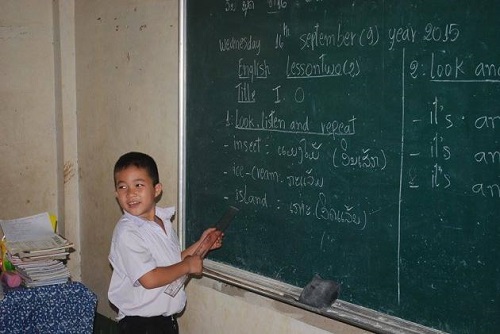English Classes Catch On in Laos
Govt is keen to start children on language classes to boost their ability to converse with others in the AEC
Some primary schools in Laos have started offering English lessons.
A group of primary students in Laos feels very excited and happy to learn English for the first time. The sounds of the ABCs and laughter can be heard from a long distance away.
In the small classroom with concrete walls and a zinc roof, a young teacher can be heard instructing her pupils to read as she points her wooden stick at English words scrawled on the blackboard.
“Many students still can’t read and write Lao so learning English is not easy for them. But I can see that they are happy to learn the new subject,” 23-year-old Koungnany Bounthavong said last week.
This is the first time for Donkoy Primary School to introduce an English curriculum to third graders in accordance with the government policy to enable students to communicate in a foreign language once they finish secondary school.
The new academic policy gives hope for Laos to integrate itself into the Asean Economic Community, which uses English as the official lingua franca.
Although this is a good policy, it is not easy for many primary schools in Laos to hold a perfect English class, as there is a lack of qualified teachers and teaching materials. Donkoy Primary School is one of the best examples.
According to the Ministry of Education and Sports, about 30 per cent of elementary schools around the country are now teaching English since the programme’s inception in 2008.
Most of the schools are situated in the cities, while the programme is lagging far behind in rural areas, according to a recent report from the department.
Donkoy Primary School’s acting principal Khonsun said that after being told by the higher educational authorities to officially kick off an English course for third graders this year, the school’s administration sent its teachers to a crash course.
“The teachers joined the English training course last year but it was held for just two days,” Khonsun said.
“The course did not upgrade their English level because the training lasted only two days, which mainly focused on lesson plans and basic instruction.”
Koungnany said that she found it difficult to teach English as she had only limited chances to learn the foreign language while attending Bankeun Normal College.
However, the lack of English skills has not become a barrier to instruction.
The teachers at her school have tried their best to teach the class by having discussions whenever they encounter a problem, especially when it comes to vocabulary they did not understand.
“When I confront difficult words, I try to learn how to pronounce them and look for their meaning from an application installed on my cell-phone. There are some occasions when we run to each other to consult on the language problem,” she said.
What impressed visitors is that although the teachers cannot speak English well, they try their best to teach their students. They put in a lot of effort to make the English lessons interesting. Although it is not a perfect English class, it is the best starting point.
Principal Khonsun said his school has 113 students and five teachers and all of the teachers are women. They don’t have enough experience teaching English and lack educational materials in English. There is also no designated English teacher there.
“The authorities now hold a training course for any teacher who would like to train in English. It’s around 4pm to 5.30pm but it’s not near our school and it’s too early as we still haven’t left school yet, so we can’t join this programme,” she said.
“So we would like to call on the authorities or the government to hold a training course for us during school holidays as we have time then,” she said.
For many students, English class is fun and exciting, as they hope to study the foreign language, which they can use as a tool of communication when they grow up.
Anousone Xayasone, a student at Donkoy, said he hadn’t been to any school to learn English and only started to study the language this year.
“Learning English is difficult but I like it because the teacher always asks us to guess something when we are studying and the teacher often gives us some fun games to play,” he said.
It’s been only a few weeks so he couldn’t speak much yet. He can only say some greetings like “how are you, good morning, good evening” and other basic words that he often hears people saying.
But it was a great start to his foray into the world of foreign tongues.
Source: The Nation

